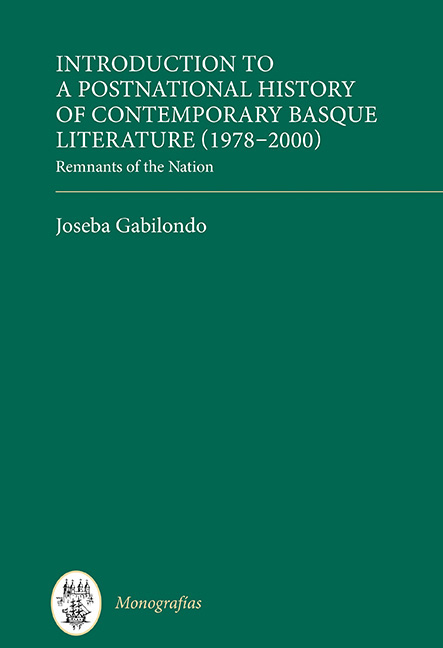 Introduction to a Postnational History of Contemporary Basque Literature (1978–2000)
Introduction to a Postnational History of Contemporary Basque Literature (1978–2000) Book contents
- Frontmatter
- Contents
- Preface and Notes on the Translation
- Acknowledgements
- I Postnational Theory and History
- 1 Postnationalism and Basque Literary History
- 2 Minor and Major Literatures: A Postnationalist Approach
- 3 From National to Postnational: A History of Twentieth–Century Basque Literature
- II Writing the Nation: On Atxaga's Ethiopia and Obabakoak (1978-92)
- III After the Nation: Hybrid Postnational Literatures (1992-2000)
- Epilogue: Basque Literatures 2001-17
- Works Cited
- Index
2 - Minor and Major Literatures: A Postnationalist Approach
from I - Postnational Theory and History
Published online by Cambridge University Press: 06 September 2019
- Frontmatter
- Contents
- Preface and Notes on the Translation
- Acknowledgements
- I Postnational Theory and History
- 1 Postnationalism and Basque Literary History
- 2 Minor and Major Literatures: A Postnationalist Approach
- 3 From National to Postnational: A History of Twentieth–Century Basque Literature
- II Writing the Nation: On Atxaga's Ethiopia and Obabakoak (1978-92)
- III After the Nation: Hybrid Postnational Literatures (1992-2000)
- Epilogue: Basque Literatures 2001-17
- Works Cited
- Index
Summary
In periods of cultural insecurity, when there are fears of regression and degeneration, the longing for strict border controls around the definition of gender, as well as race, class, and nationality, becomes especially intense.
Elaine Showalter, Sexual Anarchy (p. 4)Minority Politics in Spain and Europe
The reflection on what constitutes minority cultures in Spain – and France, the two states that comprise the Basque continental experience – and, more specifically minority literatures, has never yielded well–grounded and far–reaching results. It suffices to peruse a few histories of Spanish and French literature to understand that the ghostly specter of minority literatures is always repressed, or in more vulgar terms ‘dismissed’, and yet it comes back, so that most histories arrive at a very uncomfortable standstill: they cannot ignore the problem altogether but they push it to the side. This logic affects such different minorities as non– Spanish–French writers (Basque, Galician, Catalan, etc.), women, gays, exiles, etc. The ultimate irony is that, in English, in order to refer to writers writing in Basque, Galician, Asturiano, or Catalan in Spain, one has to resort to the label of ‘non–Spanish writers of the Spanish state’ which shows the supplemental logic of minority discourse in Spain – France faces a similar scenario with literatures written in Basque, Occitan, Arabic, Breton, Corsican, etc.
At the same time, some of the canonical authors whose work is very much influenced by their minority status – such as Luis Martín Santos, just to mention a Basque case – are treated as if they were ‘fully’ Spanish in their national identity so that any other non–Spanish characteristic becomes an accident in their biographies and writings – a ‘regional’ accident in Luis Martín Santos's case. Similarly, the Spanish national narrative award has already gone several times to ‘minority’ writers, most notably to authors writing in other non–Spanish languages and to women; yet, economic prizes such as the Spanish ‘Planeta’ are still very much dominated by male authors who are not marked as minorities – in France no author writing in any other language than French has ever received a similar prize. Consequently, there is still a need for a serious historical and theoretical discourse on minorities in Spain, France, and Europe in general. This chapter is a Basque contribution to the ongoing effort to rethink this problem.
- Type
- Chapter
- Information
- Introduction to a Postnational History of Contemporary Basque Literature (1978–2000)Remnants of the Nation, pp. 25 - 36Publisher: Boydell & BrewerPrint publication year: 2019


